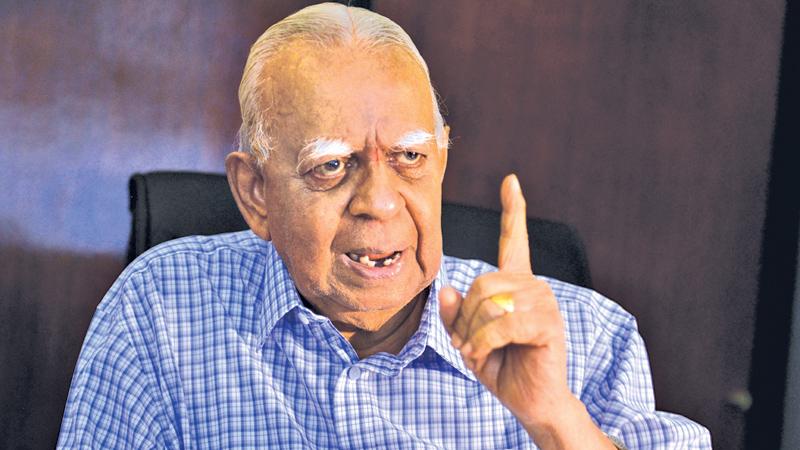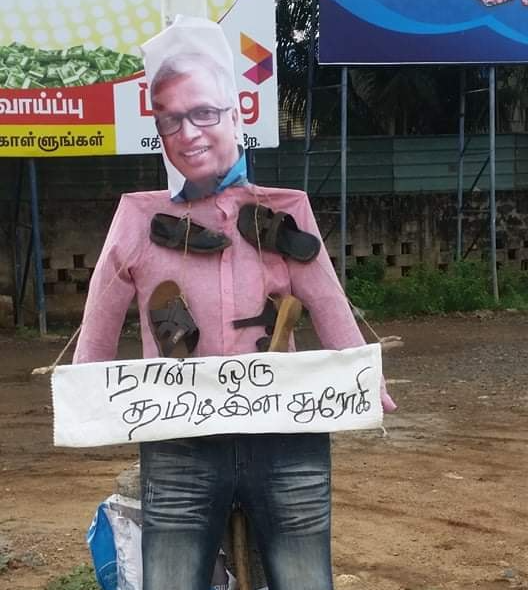
Tamil National Alliance (TNA) leader R Sampanthan said the “failure of the majority leadership” led to the emergence of the LTTE, as he hit out at a Sinhala interviewer for “promoting mischief” when he grilled the party’s spokesperson M A Sumanthiran on the Tamil struggle last week.
“Mr. Sumanthiran has been frank and forthright in his answers to questions that have been asked with the deliberate purpose of promoting mischief and disunity amongst the people of this country,” said the TNA leader in a statement emailed to the press this morning.
“The questions posed to Mr. M.A. Sumanthiran are intended to promote confusion amongst all people, both the Sinhala and Tamil people,” he added. “The purpose of this interview is to disturb the ongoing process amongst all people both Sinhalese and Tamils.”
Sumanthiran’s interview provoked outrage from across the Tamil political spectrum. His answers to questions posed, including his acceptance of Sri Lanka's lion flag and national anthem sparked widespread anger amongst Tamils across the North-East, with condemnation from even normally supportive fellow lawmakers in his own party.
Read the full transcript of Sumanthiran's Sinhala-language interview here.
“The Liberation Tigers of Tamil Eelam (LTTE) commenced their armed struggle in the late 70s and early 80s, after a period of 30 years since the commencement of the democratic peaceful and non – violent Tamil struggle,” said Sampanthan, adding,
“If there had been a reasonable resolution to the Tamil Question in the first three decades, the LTTE would never have emerged on the scene. It was the failure of the majority leadership to implement pacts and agreements entered into with Tamil Leader Mr S.J.V. Chelvanayakam who was committed to non-violence that resulted in the emergence of LTTE.”
“The Tamil people have suffered immensely in several ways during the past several decades. The Tamil people were subjected to racial pogroms even before the emergence of the LTTE. A very substantial number of Tamil people have fled the country. Tamil people will inevitably remember with pain what happened to them, but this should not confuse their thinking in relation to the main issue.”
Read Sampanthan's full statement here.
Faced with backlash from the SInhala-language interview, Sumanthiran spoke to Globe Tamil days later, stating that he 'bows his head' and paid his respect to LTTE leader Velupillai Prabhakaran,
“I never said what the LTTE did was wrong,” claimed Sumanthiran later. “No-one can undermine their sacrifices,” he added.
Speaking on Prabhakaran and the LTTE, Sumanthiran added,
“In the Tamil people’s political history and at a specific time, he is someone who gave everything and fought with the aim of obtaining liberation for Tamil people. Even if I disagree with his methods, his contribution was greater than mine or that of any others. For that we bow our heads and pay our respects."

Photograph: 'I am a traitor to the Tamil race,' reads the placard on this effigy of Sumanthiran in Nallur as he faced backlash over his Sinhala-langauge interview.
Sampanthan’s latest statement marks yet another controversial incident where the TNA leader and spokesperson have come under fire for their remarks on the LTTE and the armed struggle. As noted previously, several other members of the senior TNA leadership when speaking in Tamil have repeatedly praised the LTTE and Prabhakaran (see here and here) addressed memorial events for LTTE fighters and Black Tigers (see here, here and here) played pro-LTTE songs at rallies and even used LTTE imagery in election leaflets (see here and here).
In 2012, TNA leader Sampanthan also claimed the LTTE “never observed human rights” and that he was “on the hit-list of the LTTE”.
Just months after Sampanthan's 2012 remarks on the LTTE, he told a Tamil diaspora event in London that the LTTE were “freedom fighters”.
We need your support
Sri Lanka is one of the most dangerous places in the world to be a journalist. Tamil journalists are particularly at threat, with at least 41 media workers known to have been killed by the Sri Lankan state or its paramilitaries during and after the armed conflict.
Despite the risks, our team on the ground remain committed to providing detailed and accurate reporting of developments in the Tamil homeland, across the island and around the world, as well as providing expert analysis and insight from the Tamil point of view
We need your support in keeping our journalism going. Support our work today.
For more ways to donate visit https://donate.tamilguardian.com.

